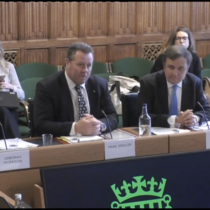Reconciling ecology and economics in England’s green & pleasant land
The following article was written by Nick Allen, Chief Executive Officer at the British Meat Processors Associationand appeared in the September edition of Meat Management magazine. It is reproduced here with their permission
Livestock farming has been instrumental in shaping not just our landscapes, but also our diverse rural communities. Until now, the system of subsidising farmers to produce food has maintained a good status quo in the food and farming industries. However, the new agricultural policy currently being drafted may be about to change all that.
Unintended consequences
Public money for ‘public goods’ sounds good on the surface. However, creating a subsidy system which incentivises farmers to stop producing and, instead, give over their land to environmental uses could have some serious and irreversible consequences.
There is a possibility that in a post-Brexit trading environment, UK producers will be facing stiffer competition from cheap imported products. Indeed, a recent article by the pro-Brexit group Lawyers for Britain argues that, rather than imposing steep WTO tariffs on imported goods, “we will be fully free to charge lower levels of tariffs, or zero tariffs, if we feel fit”. This will put added pressure on domestic producers.
In this scenario, the 34% of UK farm businesses that failed to make a profit in 2017 and instead rely on their current CAP payments to survive could conceivably decide, en masse, to give up on the expensive enterprise of food production and take up the offer of public money to turn their land over to environmental and ecological endeavours.
The economic, financial and social implications of a new agricultural policy could outweigh the environmental benefits.
If this happens, there will be a knock-on effect felt throughout the food industry and the support industries that rely on it.
Abattoir and food processing companies that need a steady domestic supply of livestock will be affected; companies that manufacture, sell and maintain farm machinery will be hit; technology companies that supply into the livestock and food industries up and down the supply chain will see a reduction in demand for their products and services.
But, perhaps the most damage will be done to the rural communities that thrive because of a strong domestic food and farming industry. Should a large concentration of farms in a local area decide to stop producing, the impact could be devastating.
Government will be handing out millions a year in subsidies but key industries would nevertheless be weakened and rural communities would be decimated. The economic, financial and social implications of a new agricultural policy could outweigh the environmental benefits.
Government is in control
Ultimately the power to shape our countryside rests with Government. Policy makers can create the right financial and regulatory conditions to enable farmers (the custodians of our traditional landscapes and supporters of rural communities) to preserve them for future generations.
What can be done to help?
The Health & Harmony scheme to protect Britain’s environment and countryside should account for the importance of livestock farmers. To ensure it does, financial incentives should be matched with practical measures to promote both productivity and environmental stewardship.
Also, there shouldn’t be a ‘one-size-fits-all’ choice of measures and funding; different land holdings and agricultural management practices should be accounted for. Finally, timing of measures needs to be flexible and fit around the farming calendar in different areas.
BMPA has called on the Government to take this approach.







